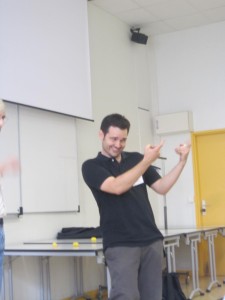This time last year I was just starting to lurk on social media, and the flurry of Edublogs nominations gave me lots of ideas for the sites and people that I could follow in the footsteps of. I enjoyed looking through them, and many have since become firm favourites. A year on, I love blogging and social media, and I appreciate the fact that the Edublogs Awards support this.
Here are my nominations:
Best individual blog
This was a very difficult choice to make as there are so many great teaching blogs out there. I follow about 90 blogs, and Ceri Jones’ ‘Close Up’ blog, constantly makes me rethink how I approach my classes. She provides ideas to reflect on and great lesson plans which I’ve used again and again. I had the pleasure to meet Ceri at the TESOL France conference in Paris in November 2011, and know first-hand that she is such a friendly, helpful person too!
Best individual tweeter
Chiew Pang (@aClilToClimb) tweets about all kinds of things, from photos for #eltpics and video interviews he has done to useful links (many from his multiple blogs) and grammar tips. He is humorous and always happy to get involved in any challenge.
Best group blog
I think the #eltpics blog “Take a photo and…” blog is definitely shaping up to be a great group blog with lots of resources and ideas for using the #eltpics tweeted by teachers all over the world. Since I’m a co-curator of #eltpics, but Fiona Mauchline does most of the curating for the site, I’m not sure if I’m allowed to nominate it…
If not, then my nomination for best group blog would definitely go to Teaching Village, curated by Barbara Sakamoto. She has posts from teachers all over the world, covering a huge range of subjects. They are always interesting to read, and give many teachers an opportunity to blog which they might not otherwise have.
Best new blog
Dale Coulter’s Language Moments blog has loads of great lesson skeletons, and really makes me want to experiment more with dogme teaching. I met Dale at the TESOL France conference too, and was impressed by how passionate he is about using dogme, and how quickly he got over new-teacher syndrome to experiment in his classes. His posts on reflective teaching have also made me think about how much more I could reflect on my lessons and how to turn this into action research. Very influential!
Most influential blog post
Way back in May, Brad Patterson invited us to get to know Cecilia Lemos through this post. In it, he also challenged us to interview members of our PLN and post the interviews on our blog. This was probably the point at which the people I had been interacting with on Twitter and blogs went from being pictures and text to real people. It encouraged me to get in touch with Naomi Shema and Lizzie Pinard on Skype, and through the whole challenge I learnt so much about the people behind the profiles. It really got Twitter buzzing, and (for me anyway) formed so many connections.
Best Twitter hashtag
This was the easiest nomination for me to make. The #eltchat hashtag is what got me hooked on Twitter. It has provided me with hours of mental stimulation, loads of ideas for my lessons and access to a group of amazing educators from around the world, many of whom I had the great pleasure to meet at the TESOL France conference. Without the buzz that every #eltchat gives me, I don’t think I would have dived into social media in quite the way I have, nor would I have got anywhere near as much out of it. The accompanying website includes summaries from the weekly chats, and is an invaluable resource for ELT teachers.
Best free web tool
Triptico is a great resource, full of different activities to use with your classes, including spinners, timers, word magnets, games and more. It works best with an IWB or projector, but can be used with a laptop too. David constantly updates it with new kinds of activity and is always on hand to solve problems through Twitter and his website. It looks great too.
Best educational use of a social network
Ann Foreman works incredibly hard to keep the Teaching English | British Council facebook page full of teaching ideas from across the web. She’s also recently started question and answer sessions using comments on the page. It has become a thriving community, with over 37,000 likes at the time of writing this post.
Lifetime Achievement
Jason Renshaw’s English Raven blog was one of the first I became aware of on entering the world of social media. He produces an amazing volume of posts, and every last one of them is worth reading. He creates beautiful freely-downloadable materials, then gives us video tutorials on how to produce our own, each running to about half an hour. He has put a lot of his own money into self-publishing the Choose Your Own Adventure ‘World Adventure Kids’ book, then chosen to offer it for free on his blog. I have no idea how he finds the time to do all this, since he is also evidently a very active dad and works full time too, but however he manages it, he never lets up on the quality of what he produces.
So there you have it. I look forward to seeing what other gems are brought to my attention by other people’s nominations.





















